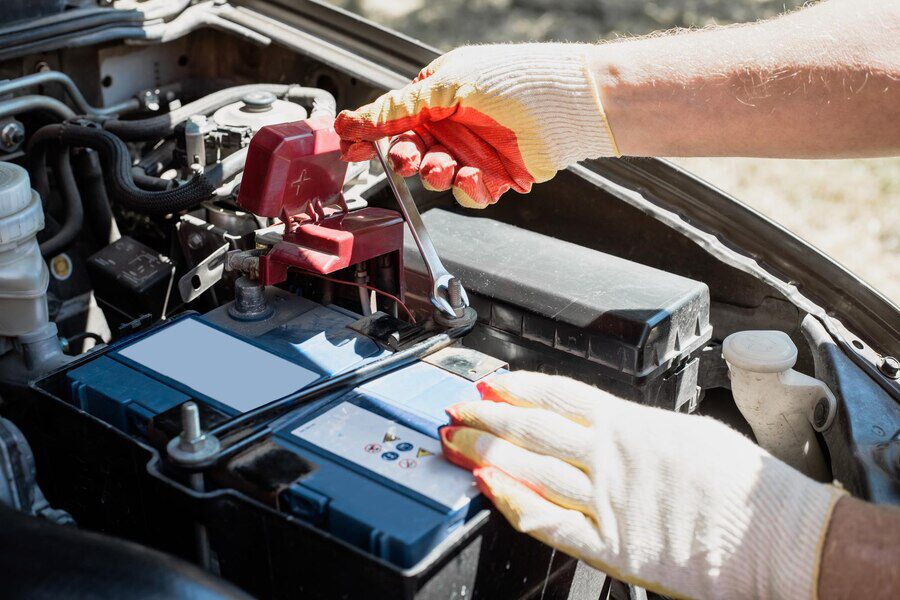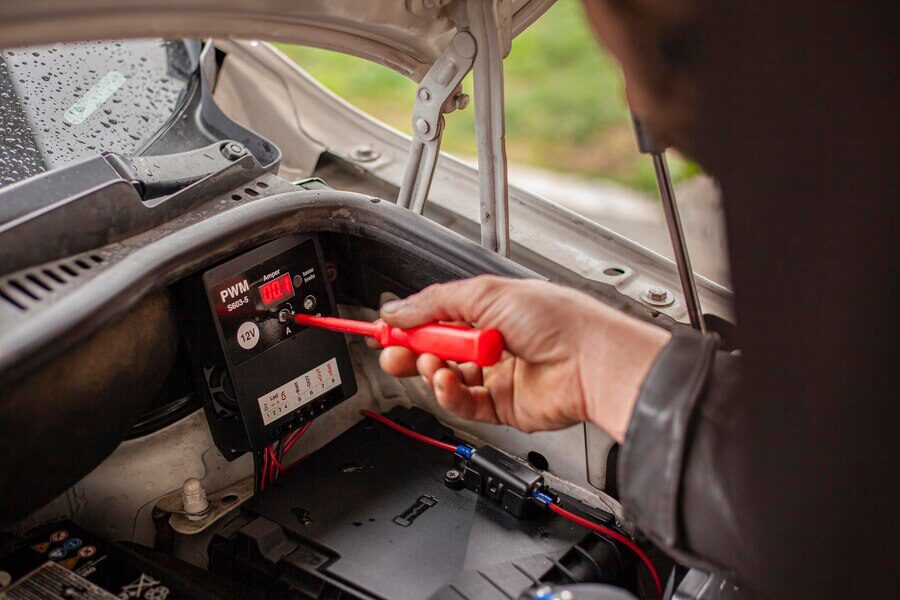
In Naperville, ensuring your car battery stands the test of time is crucial for smooth rides and hassle-free journeys. Let’s delve into practical insights on maximizing the lifespan of your vehicle’s power source. From simple maintenance routines to weather-specific precautions, this blog unveils the top tips to keep your car battery robust. No jargon, just plain English guidance to help you navigate through the nuances of battery care. Whether you’re a seasoned driver or just starting your journey, these straightforward suggestions will empower you to make the most of your car battery in Naperville’s diverse driving conditions. Get ready to hit the road with confidence, armed with the knowledge to make your battery last longer.
Choose the Right Battery
When it comes to selecting a battery for your vehicle, a one-size-fits-all approach won’t suffice. Understanding your car’s specific requirements is crucial for ensuring optimal performance and longevity.
Understanding Your Vehicle’s Requirements
Every vehicle has unique specifications, and these specifications determine the type of battery that will best suit its needs. The first step in choosing the right battery is to consult your vehicle’s manual. This invaluable resource provides detailed information about the recommended battery size, voltage, and specifications. Beyond the manual, take note of your vehicle’s make, model, and engine type. Different cars and engines may have varying power requirements, and selecting a battery that aligns with these specifications is essential for seamless integration and efficient functioning.
Factors to Consider When Selecting a Battery
- Size: The physical dimensions of the battery must match the designated space in your vehicle. A battery that is too large or too small may not fit securely, leading to potential damage and inefficient performance.
- Reserve Capacity: This refers to the amount of time the battery can deliver a steady electrical current. A higher reserve capacity is beneficial, especially in situations where the alternator may not be charging the battery adequately.
- Cold-Cranking Amps (CCA): CCA measures the battery’s ability to start the engine in cold temperatures. In Naperville’s chilly winters, a higher CCA rating is advantageous, ensuring your vehicle starts reliably even in freezing conditions.
- Battery Type: Different battery types, such as lead-acid, AGM (Absorbent Glass Mat), and gel batteries, have distinct characteristics. Consider your driving habits and the demands of your vehicle when choosing the right type.
- Brand Reputation: Opt for reputable battery brands known for their quality and durability. Reading reviews and seeking recommendations can provide insights into the reliability of a particular battery brand.
Checking Fluid Levels
Regularly inspecting and maintaining the proper fluid levels within your car battery is a fundamental aspect of battery care. The fluid, often a mixture of water and sulfuric acid, plays a crucial role in facilitating the chemical reactions necessary for the battery to generate power. Over time, this fluid may evaporate due to the heat produced during the charging process. Therefore, it is imperative to check and replenish the fluid levels regularly.
Cleaning Terminals and Connections
Corrosion on battery terminals is a common issue that can impede the flow of electricity, leading to poor battery performance. Regular cleaning of the terminals and connections is essential to prevent this corrosion buildup. Begin by disconnecting the battery terminals, starting with the negative (-) terminal first. Create a cleaning solution by mixing baking soda with water to form a paste. Use a small brush, like an old toothbrush, to apply the paste to the terminals and connections, scrubbing away any corrosion. Once clean, rinse the terminals with water and dry them thoroughly.
Tightening Loose Cables
The electrical connections within your battery can be compromised if the cables are loose. Loose cables may result in electrical disruptions, affecting your car’s overall performance and potentially causing starting issues. Regularly inspect the battery cables for any signs of looseness or corrosion. If you find any loose cables, use the appropriate wrench to tighten them securely. Ensure that the connections are snug but not overtightened, as excessive force can damage the terminals.
Keep an Eye on Temperature
Effects of Extreme Temperatures on Battery Life
Naperville experiences a wide range of temperatures throughout the year, from freezing winters to scorching summers. These extreme conditions can significantly impact the performance and lifespan of your car battery. Understanding these effects is crucial for maintaining a healthy battery.
- Cold Temperatures: In winter, low temperatures can slow down the chemical reactions within the battery, leading to reduced power output. Cold weather also increases the thickness of the engine oil, making it harder for the engine to turn over and placing additional strain on the battery.
- Hot Temperatures: On the other hand, the blistering heat of Naperville’s summers poses a different set of challenges. High temperatures can accelerate the chemical reactions inside the battery, causing the electrolyte to evaporate more quickly. This can result in a loss of fluid, leading to decreased battery life and potential damage to internal components.
Implementing Protective Measures
- Shielding from Direct Sunlight: One effective way to mitigate the impact of extreme temperatures is by parking your vehicle in shaded areas whenever possible. Direct sunlight can intensify the heat absorbed by the battery, hastening its aging process. Choosing shaded parking spots, especially during hot summer days, helps maintain a more moderate temperature around the battery.
- Using Insulation: Consider using insulating materials to protect your battery from temperature extremes. Battery insulation wraps or thermal blankets can help regulate the temperature, preventing both excessive heat and cold from affecting the battery’s performance. These simple yet effective measures can go a long way in preserving the overall health and longevity of your car battery.
By being mindful of the temperature conditions in Naperville and implementing these protective measures, you can significantly extend the life of your car battery. Regularly check the weather forecasts and adjust your parking habits accordingly to ensure optimal performance, regardless of the season.
Minimize Short Trips
Impact of Short Trips on Battery Health
Driving short distances, common in urban settings or for daily errands, poses a unique challenge for the battery’s charging cycle. The alternator, responsible for replenishing the battery’s charge, needs a certain amount of time to work efficiently. In the case of short trips, the alternator may not operate long enough to restore the energy consumed during ignition and short bursts of driving.
Learn How to Consolidate Errands
To counteract the negative impact of short trips on your car battery, it’s crucial to adopt a more strategic approach to errand running. Learning how to consolidate errands allows you to combine multiple tasks into a single, more extended trip. By doing so, you provide the alternator with a longer duration to operate, enabling it to recharge the battery more effectively.
Invest in a Battery Charger
Investing in a battery charger can significantly contribute to the longevity of your car battery. Understanding the types of battery chargers available and establishing a charging schedule are key aspects of this proactive approach.
Types of Battery Chargers
When it comes to battery chargers, there are various options, each catering to different needs:
- Trickle Chargers: Trickle chargers are designed to deliver a low, constant charge to the battery. They are ideal for long-term storage or maintaining the charge during periods of inactivity. These chargers prevent overcharging, ensuring a steady and safe replenishment of the battery.
- Smart Chargers: Smart chargers, also known as intelligent or microprocessor-controlled chargers, offer advanced features. They analyze the battery’s condition and adjust the charging rate accordingly. Smart chargers can diagnose issues, such as sulfation or a failing cell, and apply the appropriate charging profile. This not only extends the battery life but also enhances overall performance.
Establishing a Charging Schedule
Creating a routine for recharging your battery is crucial for maintaining optimal charge levels. Follow these steps to establish an effective charging schedule:
Understand Your Driving Patterns
Analyze your typical driving patterns and usage. If you primarily take short trips, your battery may not have sufficient time to recharge fully. In such cases, a regular charging schedule becomes even more critical.
Select an Appropriate Charger
Based on your driving habits, choose the right charger. If you often leave your vehicle unused for extended periods, a trickle charger may be suitable. For those with varied driving patterns, a smart charger’s adaptability is beneficial.
Set a Consistent Charging Time
Choose a time when your vehicle is parked and not in use for an extended period. Consistency is key, so try to charge your battery around the same time each day or week. This practice ensures a regular maintenance routine.
Avoid Overcharging
Be mindful of the recommended charging duration to prevent overcharging, which can damage the battery. Trickle chargers are designed for long-term use, while smart chargers often have features to avoid overcharging.
Monitor Battery Health
Some smart chargers come with monitoring features, allowing you to check the battery’s health and charging status. Regularly monitor these indicators to address any potential issues promptly.
Conclusion
Implementing the top tips for extending the life of your car battery in Naperville is a wise investment in the longevity and reliability of your vehicle. At (630) 200-2731, we understand the importance of a well-maintained battery, and our comprehensive guide serves as a valuable resource for drivers seeking to optimize their battery performance. By following our expert advice, we believe that car owners can not only extend the lifespan of their batteries but also avoid inconvenient breakdowns. Trust in our tips and make the most of your vehicle’s battery life with confidence.


